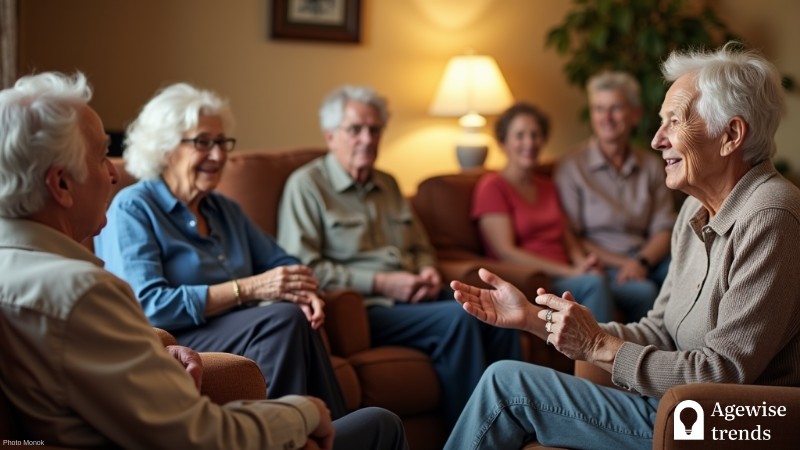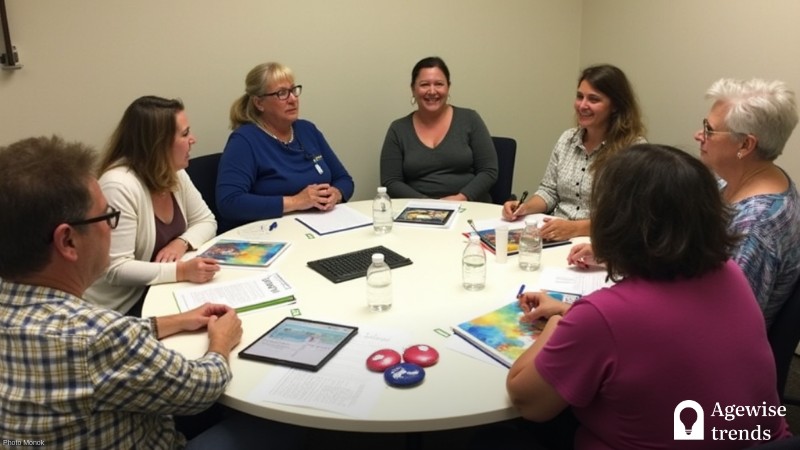In many rural areas, accessing mental health services is a significant challenge, especially for senior citizens. Programs like Libraries for Health are stepping in to fill this gap. This initiative partners with nine libraries across Central Texas, employing peer support specialists—individuals who have personal experience with mental health or substance use issues—to assist others in similar situations.
By utilizing familiar community spaces, the program ensures that help is accessible, especially for seniors who may feel isolated or hesitant to seek formal mental health services.
Libraries were chosen because they are welcoming spaces for people of all ages, including seniors. These institutions provide a safe and nonjudgmental environment where older adults can ask for help without fear of stigma. Peer specialists are trained to offer emotional support, teach coping skills, and connect seniors to essential resources such as healthcare providers or social services. This approach is especially valuable in rural areas, where traditional mental health services are scarce.
Key Takeaways
In rural areas, programs like Libraries for Health are addressing the challenge of accessing mental health services by employing peer support specialists who provide emotional support and connect seniors to essential resources.
- Libraries in Central Texas partner with peer support specialists to offer accessible mental health services to senior citizens, especially those who feel isolated or hesitant to seek formal help.
- The peer support model faces financial challenges, including low pay for specialists and inadequate Medicaid reimbursement rates, which threaten the sustainability of programs like Libraries for Health.
- States like Texas and Georgia are exploring solutions to sustain and improve peer support services, such as increased pay, expanded Medicaid coverage, and clear career advancement opportunities for specialists.
A growing need in rural communities
The Texas Department of State Health Services reports that over 80% of the state’s 192 rural counties lack sufficient mental health professionals, and some counties have none at all. For towns like Jarrell, with a growing population and no social or health services, programs like this are a lifeline. Seniors, who often face unique mental health challenges such as grief, loneliness, or cognitive decline, benefit greatly from having access to trained support in their community.
Susan Gregurek, director of the Jarrell Community Library and Resource Center, highlighted the program’s impact on her community of 25,000 residents, many of whom are seniors without access to specialized care.
For example, peer specialists like Ailina Aponte, who transitioned from library coordinator to mental health supporter, have made significant strides in helping seniors. Aponte shared how her role allows her to provide emotional support and assist clients, including older adults, in setting recovery goals. Her work underscores how libraries can empower both specialists and the communities they serve.
The financial hurdles
While the peer support model has proven effective, it faces financial challenges. Peer specialists in Texas typically earn between $10 and $18 per hour, below the state’s living wage of $20 for a single adult. The Libraries for Health program offers $22 per hour, but this is still insufficient for many specialists to maintain financial stability.
For seniors reliant on Medicaid, these financial issues extend to the services they receive. In Texas, Medicaid reimburses peer support sessions at just $11.25 per fifteen minutes, compared to a national median of $13.65. These low rates make it difficult to retain specialists and sustain programs. The Libraries for Health initiative, funded by the St. David’s Foundation and ViaHope, faces uncertainty as funding is set to end in June 2025.
Looking ahead
To sustain and improve peer support for seniors and others, states like Texas and Georgia are exploring solutions such as increased pay, expanded Medicaid coverage, and clear career advancement opportunities for specialists. Advocacy groups stress the need for manageable workloads and better access to mental health resources for those providing peer support.
Despite the challenges, many specialists remain dedicated. For instance, Victoria Alaniz, a peer specialist in San Marcos and Buda, is pursuing a master’s degree in counseling, inspired by her work. Stories like hers highlight the potential for peer support roles to foster personal and professional growth.
As Libraries for Health evolves, its impact on rural communities and senior citizens continues to inspire broader applications of peer support. Efforts at libraries like Jarrell’s to train new specialists—even as funding wanes—demonstrate the community’s recognition of the program’s value. This determination offers hope for a future where seniors in rural areas have greater access to mental health resources and support.















